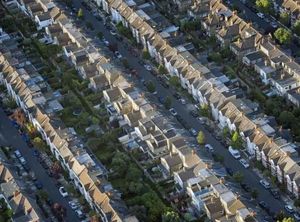Rise in proportion of people renting privately in Black Country
More people are renting privately in the Black Country than a decade ago, new figures show.

The latest figures from the 2021 census of England and Wales come as a housing campaign group calls on the Government to come good on its promise of a better deal for private tenants.
Figures from the Office for National Statistics show 20,006 households were renting privately in Wolverhampton when the census was carried out in March 2021 – 19 per cent of the 105,142 households in the area.
At the time of the previous census in March 2011, 13.2 per cent of households were private renters – meaning that the share has increased over the past decade.
In Walsall, 18,336 households were renting privately in March 2021 – accounting for 16.3 per cent of households, which was up from 11.7 per cent 10 years beforehand.
There was also a rise in Dudley, where 18,940 households were renting privately in March 2021 (13.8 per cent of households) – up from 9.2 per cent in 2011.
In Sandwell, the figures showed 24,237 households were renting privately when the census was carried out in March 2021 – 18.6 per cent of the 130,246 households in the area.
In March 2011, 12.9 per cent of households in the area were private renters.
Across England and Wales there are now five million private renters (20.3 per cent of households), up from 3.9 million (16.7 per cent) in 2011.
Dan Wilson Craw, deputy director of the housing campaign Generation Rent, said these tenants are “paying high rents to private landlords, face a much greater risk of living in a poor-quality home, and live with the threat of eviction at short notice”.
He added that despite the Government recognising the need for reforms in the sector – such as abolishing so-called 'no-fault' evictions – it is yet introduce legislation to properly support private tenants.
Separate figures from the ONS and the Valuation Office Agency show that median private rent in the West Midlands was £660 a month as of March 2021 – up 32 per cent from £500 in June 2011 – the earliest comparable figures.
Shelter, a charity that tackles homelessness, said the "only lasting solution" to the housing crisis is to build more social homes.
It pointed to a waiting list of more than a million households for social housing across England, saying that the social housing is lost every year to sales and demolitions.
Polly Neate, chief executive of the charity, said: “It’s time for the Government to invest in a new generation of good quality social homes with genuinely affordable rents pegged to local incomes.”
Across England and Wales, there has been little change in the amount of social housing in the past decade – while the number of households in social homes increased from 4.1 million to 4.2 million, the proportion actually fell, from 17.6 per cent of households to 17.1 per cent.
The census figures also suggest it may be getting harder to join the housing ladder.
The number of households owning their home through a mortgage, loan or shared ownership has dropped across England and Wales, from 7.8 million (33.5 per cent of households) in 2011 to 7.4 million (29.7 per cent) last year.
A spokesperson for the Department of Levelling up, Housing and Communities said: “Ensuring a fair deal for renters remains apriority for the government, that’s why we will deliver on our commitment to abolish Section 21 ‘no fault’ evictions and introduce a Renters Reform Bill in this Parliament."





